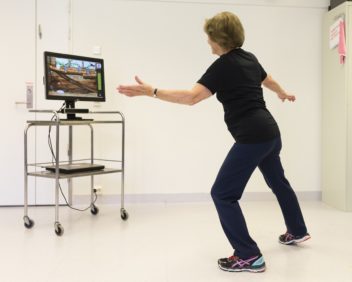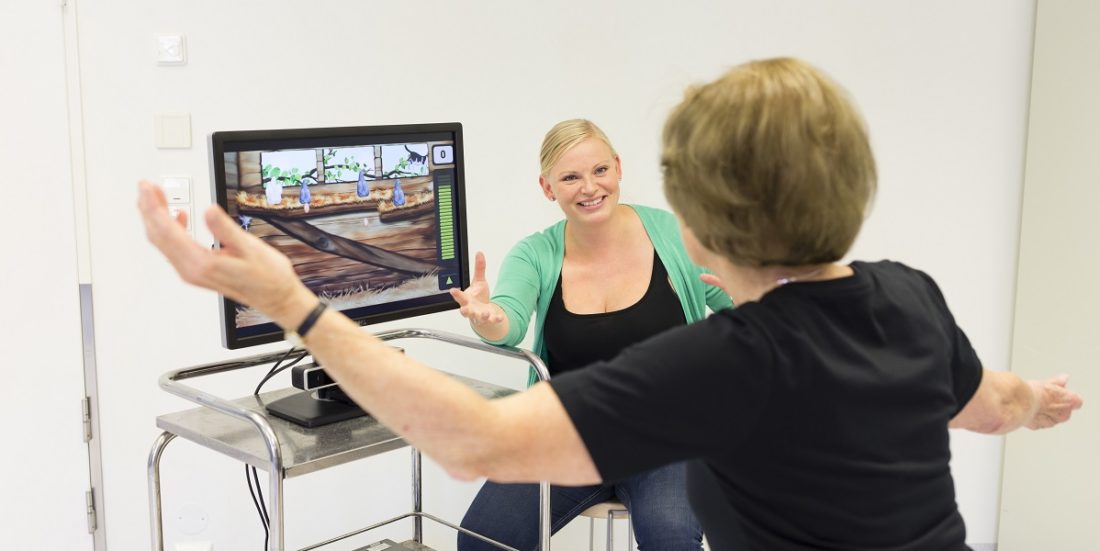Exergames for the elderly
Interactive computer games that encourage people to move can be more than just fun. They can help in rehabilitation and in encouraging the elderly to exercise.
EXERCISE—Pokemon Go has gotten people of all ages off of their couches and out of the house. But games that require movement to earn points have actually been on the market for some time.
Researchers in NTNU’s Geriatrics, Movement and Stroke group have taken a close look at exercise games currently on the market to see if any are good enough to help elderly patients keep active, and if they may be useful for rehabilitation after illness or injury. They have also surveyed how elderly patients feel about using this type of technology.
- You might also like: Personalized care for dementia patients

Interactive computer games that get people to exercise are an important approach to handling the health care challenges we face in the coming years, especially with a rapidly ageing population. Photo: Thor Nielsen
Too easy to cheat
The researchers specifically looked at walking games—games that require taking a certain amount of steps to earn points. And the results are clear: elderly patients see a practical use for these types of games, and are willing to use them, as long as they are easy to use and targeted for the correct age group. Games currently on the market work for general physical activity, but aren’t good enough when it comes to specific, targeted exercises.
“There are several TV-based game systems on the market that offer physical training for the players. They have plenty of potential, but they just aren’t good enough yet. Even though they are promoted as physical rehabilitation and work well to get users moving, they aren’t always very effective,” says Nina Skjæret Maroni, who has recently completed her PhD at the Department of Neuromedicine.
“It’s pretty easy to find simpler ways of doing the different movements and still earn points. Essentially, players can find ways to cheat and earn more points for each movement,” she says. Maroni’s PhD thesis was focused on on gaming technology and elderly user.
- You might also like: Does it matter how long you sit—as long as you are fit?
Important welfare technology
She hopes that game producers and researchers can work together to develop exercise games, so that they can also be used in clinical settings in the future.
“Several departments at St. Olavs hospital have shown interest in using gaming technology to help get patients back on their feet and into rehabilitation quickly,” she says.
Maroni points out that exercise games are a type of welfare technology that will be important in helping combat future public health challenges that will result as the number of elderly in the Western world grows.

There are a number of different interactive training programs on the market already. This photo shows a game from Nintendo. Photo: Nintendo
“Looking at the big picture, it is very important that we continue to develop exercise games. Life expectancy is increasing, but we aren’t getting enough exercise to prevent illness and disease that comes with old age and little activity. We need to start taking into account more years of illness and physical impairments than we have previously,” she continues.
“In addition, the working population is decreasing. This may lead to staff shortages in the healthcare sector. But improved gaming technology will make at-home exercise for elderly patients easier, and will reduce strain on physiotherapists and other health care personnel,” she says.
Exergaming for the elderly
Researchers will continue to study exergaming via the Exact project (Exergaming for active and healthy ageing) which is a part of NTNU Health. The goal is to encourage physical activity among the elderly, and facilitate home-based rehabilitation programmes that are tailored to each patient. This is an interdisciplinary group that includes motion scientists, physiotherapists and computer experts all working together at NTNU. They will also study how neural activity is affected by computer games together with researchers at the University of Flensburg in Germany.
NTNU professor Beatrix Vereijken has been Marioni’s main supervisor.
Nina Skjæret Maroni’s PhD dissertation.
Want to know more? Check out these links:
https://journal.frontiersin.org/article/10.3389/fpsyg.2016.00964/full
https://www.sciencedirect.com/science/article/pii/S1386505615300514





